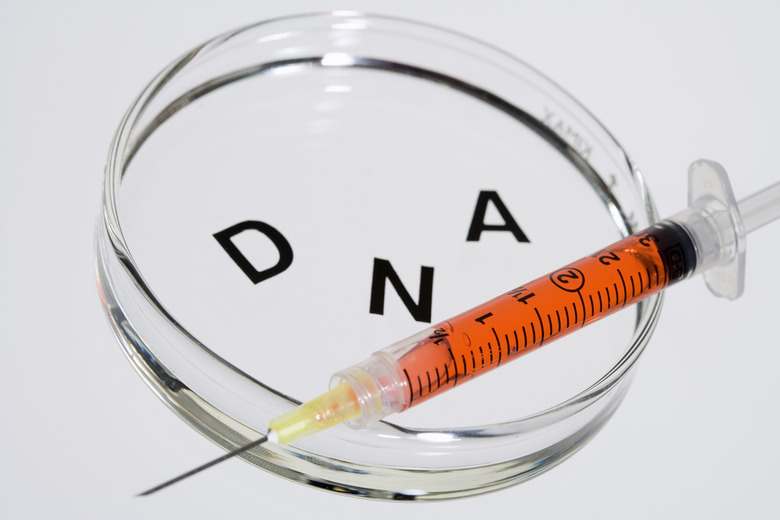What Is The Evolutionary Significance Of The Genetic Code's Near Universality?
The genetic code is a nearly universal "language" that encodes directions for cells. The language uses DNA nucleotides, arranged in "codons" of three, to store the blueprints for amino acid chains. These chains in turn form proteins, which either comprise or regulate every other biological process in every living thing on the planet. The code used to store this information is almost universal, which implies that all living thing that exist today share a common ancestor.
Last Common Ancestor
Last Common Ancestor
The fact that all organisms more-or-less share a genetics code strongly implies that all organisms shared a distant common ancestor. According to the National Center for Biotechnology Information, computer models have suggested that the genetic code that all organisms use is not the only way a genetic code could work with the same components. In fact, some may even resist errors better, meaning that it is theoretically possible to make a "better" genetic code. The fact that despite this, all organisms on Earth use the same genetic code suggests that life on Earth appeared once, and all living organisms are descended from the same source.
"Almost" Universal?
"Almost" Universal?
Exceptions to the "universal" genetic code do exist. However, none of the exceptions are more than minor changes. For example, human mitochondria use three codons, which normally code for amino acids, as "stop" codons, telling cellular machinery that an amino acid chain is done. All vertebrates share this change, which strongly implies that this happened early in vertebrate evolution. Other minor changes to the genetic code in jellyfish and comb jellies (Cndaria and Ctenophora) are not found in other animals. This suggests that this group developed this change not long after splitting off from other animal groups. However, all variations are believed to be ultimately derived from the standard code.
Stereochemical Hypothesis
Stereochemical Hypothesis
There is an alternate hypothesis to explain the universality of the genetic code. This idea, called the sterochemical hypothesis, holds that the arrangement of the genetic code stems from chemical constraints. This means that the genetic code is universal because it's the best way to set up a genetic code under Earthly conditions. The evidence for this idea is inconclusive. While some evidence supports this idea, changes to the genetic code, both natural and artificial, suggest that other genetic codes might work just as well. More importantly, the sterochemical hypothesis is not mutually exclusive to the idea that the genetic code is universal due to common descent; both concepts could contribute.
Early Proteins
Early Proteins
According to a paper published by Princeton biologist Dr. Dawn Brooks and colleagues in the journal "Molecular and Biological Evolution," the fact that all organisms are descended from a common ancestor means that researchers can extrapolate some characteristics of that common ancestor. Based on the "oldest" genes in living organisms, those common to all modern living things, researchers can discern which proteins and amino acids were most common when the last common ancestor of all living things existed. Of the 22 "standard" amino acids — those found in the universal genetic code — about a half-dozen very rarely appear in the last common ancestor's proteins, implying that either these amino acids were very rare or they were added to the genetic code later.
Cite This Article
MLA
Boumis, Robert. "What Is The Evolutionary Significance Of The Genetic Code's Near Universality?" sciencing.com, https://www.sciencing.com/evolutionary-significance-genetic-codes-near-universality-20448/. 24 April 2017.
APA
Boumis, Robert. (2017, April 24). What Is The Evolutionary Significance Of The Genetic Code's Near Universality?. sciencing.com. Retrieved from https://www.sciencing.com/evolutionary-significance-genetic-codes-near-universality-20448/
Chicago
Boumis, Robert. What Is The Evolutionary Significance Of The Genetic Code's Near Universality? last modified August 30, 2022. https://www.sciencing.com/evolutionary-significance-genetic-codes-near-universality-20448/
